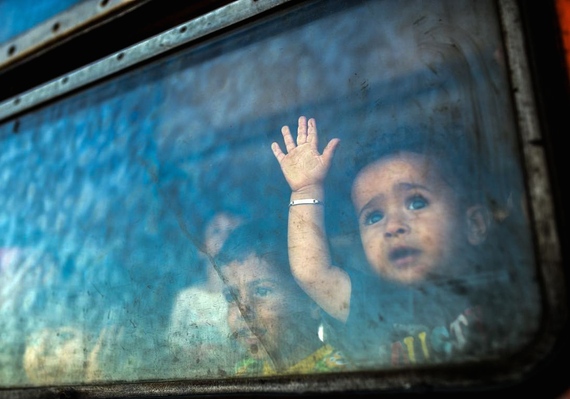"Empathy is about finding echoes of another person in yourself." --Mohsin Hamid.
Sometimes something in life calls our attention. I don't mean the attention of distraction like the release of the latest iPhone. I mean the attention of something deeper, something that calls us from within.
The current refugee crisis and the European reaction had this effect on me. In the plight of a helpless people, the many barriers they encounter and the misguided fear and rejection they face, I have begun to reflect on the human soul.
I am a positive psychology writer and practitioner. As such, I write about optimizing the human experience and enable people to find ways to be their best possible selves. Most times, people's goals are restricted to bodily concerns and worldly affairs. But sometimes I come across a different kind of person, one who connects with something deeper within them and desires to live a life of belonging to something larger than the self.
I've often wondered what it is that differentiates the vast majority of us from the few who seek true fulfillment. There is no doubt that some of us are more morally sensitive. But does that suggest that the rest of us are doomed to a life of hedonistic pursuits?
I've found that the people who desire to live whole hearted lives are not always the ones who are naturally morally sensitive, but those whose lives have been transformed by controlling their destructive and disturbing emotions so that they can act for the good, no matter what they do.
Science backs this up. The plasticity of the brain plays a large role in our capacity for individual transformation. Just as detrimental neural pathways can be reinforced with time if we do nothing to improve them, traits of compassion and altruism, that evolved tens of thousands of years ago to ensure group survival, can be nurtured and enhanced through a conscious diet of virtuous acts.
This is not merely about moral reckoning. As a humanity, we face problems of colossal consequences - and the internal mechanisms of fight and flight that we resort to, have done little to improve them. Waiting for evolution to finesse its craft and cultivate universal compassion may have worked had the speed of our times and the enormity of global population not brought the potential for disaster right to our doorstep. We need cultural transformation, and history shows that it works wonders for speeding up evolution's game.
On an individual level, it means developing greater self-awareness. Our primal fears for physical survival, no longer applicable in the relative safety of the 21st century, feed off the attitudes and unconscious biases we harbor. Unless we are aware of the ideas we carry, about ourselves and others, we will not be able to channel the drive to protect, compare and compete in positive directions.
It means seeking true understanding by unlearning much of what we know. As Hegel argued two centuries before our age of informational speed and impatience, true knowledge develops when we let go of the familiar, of our beliefs and biases, and sit firmly in the space between our urges and our responses. For it is then that we see beyond color and creed and connect through a common humanity that allows us to enter other people's worlds, even if figuratively.
This brings me to the societal imperative for change. As Barry Schwartz has pointed out, human nature is not only created by the institutions in which we live, it will also change according to the ideas they promulgate. When our institutions and governments break the world down into good and bad, they stoke the essence of evil. When we devalue and dehumanize other beings, it gives us the right to desensitize ourselves to their suffering. When they fuel our collective fears of safety through boundary walls and codes of red and orange, they give rise to animalistic passions that are, as Hume famously said, "slave to reason". In these unconscious acts, we sink our collective soul.
We need a more wholesome approach. One that has the clarity of vision to see the good and evil within each of us, as individuals and societies, so that we break the barriers of superiority that divide us. We are whole when we accept our dark side, our desire to keep out refugees, to blind ourselves to the suffering of others, to cling onto the certainty of our own comfortable lives. After all, we are human, and that means we are fallible.
But it also means that we can use our dark side in service of what is good within us. We have all witnessed, through this crisis, acts of altruism that leave us in awe of our human goodness; stories of kindness and compassion that elevate us on what Jonathan Haidt has called the dimension of divinity. We have indeed two opposing wolves in our hearts, as the old folktale goes. In our fearful and distracted lives, most of us have perhaps starved the wolf of compassion for too long.
In order to rise to the challenges we face, the Dalai Lama urges us to become aware of our reactions and to expand our appreciation of human goodness beyond our "tribes". It reminds me of Rousseau's warning against the superiority of "amour propre". Kings can have no pity he said, because they never fear walking in the shoes of the other.
Universal compassion is a high standard that we may not be ready for. But we can take a step closer, even if we do not see its fruits in this lifetime. After all, the soul yearns to live on after we die. I think it's a good way to honor its call.

